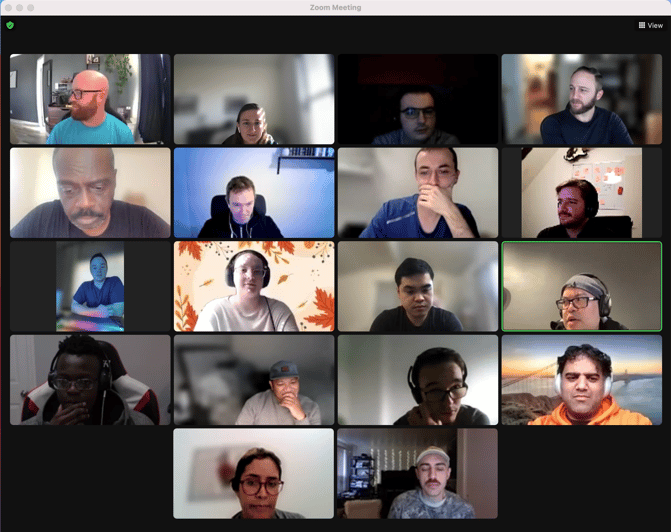What is a Daily Standup?
Daily standups provide lasting value well beyond the 30 minutes. These meetings are held daily with members of each cohort to bring learners together to start the day. The goal of this meeting is to share with one another what is being worked on and/or what has been accomplished, and if there are currently any blockers on a project. This gives learners an opportunity to offer support to each other in the community, if applicable. It also enables learners with the chance to draft a clear path to achieving their goals and working through blockers to reach success. Program managers facilitate these meetings to ensure all learners share their progress and status updates with the group, similar to in industry as a manager would do.

How Are Standups Used in Industry?
In industry, daily standups are a useful tool to bond team members together and encourage internal communication and interaction among teams. On a simpler note, it's a great measure of ensuring everyone starts their work everyday. In addition, daily stand ups are an opportunity to make sure no one is stuck in a corner, overthinking a problem that may not fit the direction of the product. For example, if an engineering manager can spot that there is a bug in the API of team B, and an engineer is planning to spend his whole day debugging it, this is an opportunity to redirect focus and prioritize responsibilities. This scenario would result in posting a ticket address to them and allowing the correct team to handle it. It gives engineering managers and employees the space to align tasks in the right direction and order of importance at the beginning of the day. This level of internal communication is crucial to the successful functioning of teams.
A more obvious benefit of standups to engineering managers is accountability which helps show supervisors that work is getting done and employees have that place to show up and get themselves started on tasks for the day. This is especially important in remote teams. Also, these meetings are an efficient way to identify blockers and solve them within the team/with the engineering manager in industry as there are multiple perspectives and ideas to work through a solution to the problem.
1.) Preparation for Industry
Standups are common among many industries but especially prevalent in technical teams. Almost every job a programmer will hold, will have a daily standup meeting. By starting these meetings in technical training, learners are able to understand best practices and prepare for when they are faced with real-world meetings. It’s important to practice these meetings in an agile environment by giving incremental progress updates as students go through projects and seasons of their tracks. This is a valuable skill that they will carry with them throughout the entirety of their careers and will make them stand out on the job when it comes time to give their first updates in standup as a new employee.
Attending daily standups and actively participating with cameras on is essential to being prepared for a career in the technical industry. The main reasons these meetings are useful for engineering managers are communication and productivity. Engineering managers are able to connect with their team and work through any blockers in real time with their engineers. They can set goals and plan out the essential tasks for the day amongst their team and start the day off. This meeting allows for connecting with one another and gaining project support where needed. Reducing project delays and resolving problems quickly are two major benefits of daily standups from the eyes of an engineering manager. Also, sharing progress and major outcomes are a great way to encourage and boost morale within the team. It helps align everyone’s status updates in one space and ensure productivity and progress on overall goals for the organization and bigger picture. This is one of the best ways for an engineering manager to do their job and manage their team.
2.) Sense of Community
During daily standup meetings, learners are able to have face-to-face virtual time with the other members of their cohort. In a remote learning environment, this is crucial to building a learning community. Members are able to participate and share their knowledge with one another. Oftentimes, they can share interviewing best practices and insightful tips from specific questions in past technical interviews. This networking is invaluable to their future success and gives them motivation to keep working towards their ultimate goals. Many members in the community have recently finished something that others might have just started. This is where shared knowledge comes in and the ability to assist others within the community. Learners within the program want to see each other succeed just as much as each individual wants to succeed, as well as share in that success. Program managers and other students are excited when someone reaches a big milestone in a project or lands a job interview in industry.

3.) Work Through Blockers/Problem-solving Skills
One of the key reasons to attend standup is to actively participate and gain valuable knowledge. Attending a standup ensures one is never stuck on a blocker longer than the next standup. In these meetings, learners will receive a tip or trick to get unstuck and move on through the problem. There’s likely someone else in the meeting who has encountered the same problem. These students are able to provide one-on-one support after the meeting to help one another better understand how to get through the issue and solve it next time it is encountered. This type of problem solving is a key soft skill for the 21st century and one that employers value in quality candidates. Being able to search for solutions and approach the right people with a blocker is key to reducing wasted time on a project. It all comes down to learning by doing, and one won’t be able to work through blockers without the support of attending standup. This level of critical thinking and resourcefulness is critical for success in both the Qwasar program and in a future career.
4.) Accountability
By having this meeting in which learners are required to show up on time and ready to participate, there is a level of accountability being developed for each student. This accountability will translate into every career held by the student down the road. It is a quick meeting to identify issues and prevent lags in quality working time. Instead of mulling over a problem for days on end, the cohort comes, shares blockers, gets support, and everyone is able to move on through to the next step, while understanding the concepts of what is being worked on. If someone is struggling, the learner needs to be open about that and get support from a senior student where applicable. This standup meeting helps retain focus by narrowing down thoughts to briefly describe what is being worked on and how to overcome any problems to get to the next step. It pulls someone away from their code for a few minutes, and allows them to come back to it with a fresh perspective. This is an extremely useful tool that is recommended by learners when encountered with a blocker. It's a great way to start the day and get right into coding with little distractions. During standup meetings, program managers utilize progress tracking forms to determine if follow up is needed for each student. These are used to monitor when learners are consistently meeting progress achievement or falling behind on deadlines.
5.) Communication Skills
Arguably one of the most important reasons that we do daily standup meetings is to develop excellent communication skills among each member of the community. Through sharing daily progress updates and asking for help within a group, learners are brought out of their comfort zone and forced to enhance their communication. This is an essential soft skill that is required for any industry and contributes to one’s own personal growth. This relates back to how our style of learning is different from the traditional lecture-based learning that most schools and early education emphasizes for students. Talking in a group is difficult for some and as time goes on, learners become more and more comfortable sharing with their cohort. They learn industry language and lingo along the way and a few months in they talk “like a developer”. It is amazing to see how confident learners become in standup as time goes on.
6.) Morale
As time goes on, learners get to know the other members of the cohort considerably well, as one would in a classroom environment or job setting. They are able to make connections and friends with others on the programming journey. By hearing other student updates and offering support through their struggles and challenges, everyone is able to gain knowledge from one another and oftentimes, share in successes. When other students succeed, every learner is able to celebrate their accomplishments and achievements with one another in this daily standup meeting. It’s an amazing feeling when a member of a cohort gets a job offer they’ve been interviewing for and it motivates others to keep pushing. These meetings boost morale for the entire cohort and encourage them to keep going.
Qwasar graduates are prepared for industry in many ways throughout our programs with a rigorous curriculum, extensive portfolio, and a multitude of technical interviews. They are also highly prepared for on-the-job success with lots of practice with daily standups and are able to perform from day 1.
The Students that Attend Standup are the Students that Succeed
Those with consistent attendance are the ones who perform well on the job and receive positive feedback from their employers. By getting into a consistent routine of attending these meetings and sharing progress updates, learners become more efficient at communicating effectively. The habit of consistency is not easily mastered but focusing on getting better each day and working towards an end goal is important. Consistency is working on small habits of growth over time and doing them well. By doing this well, they are setting themselves up for success and preparing for the technology industry that is ever-changing and dynamic. Another important reason to attend is that this type of meeting is something that an individual wouldn’t skip a standup at a job, so why get in the habit now. This will only lead to problems down the road with unfortunate consequences. Being in a community of other learners who are also on a journey to reach proficiency in programming can be empowering and incredibly supportive. Many others have walked in the same path and are there to support and encourage one another as each learner begins the same projects they once began months prior. The sense of community and willingness to help others on projects and in small groups is what makes the community so unique and supportive. It’s exciting to see how much each learner and their peers will grow in skills and confidence over time. This happens from attending the standup meetings consistently and actively participating. These skills developed over time help learners succeed throughout Qwasar and ultimately on-the-job.
While the idea of attending a daily meeting might seem like it “gets in the way” of time that could be spent coding or making progress on projects, there are very real benefits to attending these daily meetings. While one may not see the effects of these meetings right away, down the road they will start to talk like a developer with confidence, and look forward to daily standup.


